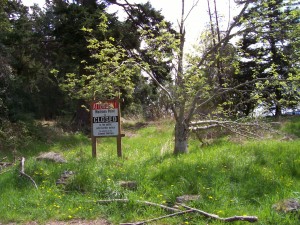— by Margie Doyle —
(Correction, March 14: the San Juan County Land Bank was NOT involved in the maintenance and use agreement for Madrona Point, as had been previously stated. The following article has been modified without that statement. We aplogize for the mis-statement.)
At recent meetings of the Eastsound Planning Review Committee, John Campbell and Peter Fisher joined forces to break the logjam that is keeping Madrona Point closed to the public.
John Campbell presented a letter (Oct. 20, 2013) he wrote to the County Development and Planning Department, asking, among other comments, for a revision to the Open Space-Historic-Natural Features section of the Eastsound Sub-Area Plan (16.55.120).
In his letter, Campbell charged county officials to “Encourage the County to work and cooperate with the Lummi owners of Madrona Point to provide and maintain public access in conformity with the enabling Covenants.” The letter was supported by the EPRC, a County Advisory Committee.
Background
In 2007, Lummi officials installed the sign, prohibiting access to the park in response to the camping and partying that were taking place on grounds that are sacred both to Lummi and to pioneer families. The property was originally Indian burial grounds; in the late 1800’s it was taken over by Orcas pioneers as a cemetery district. Madrona Point was the site of one of Orcas’ many resorts in the 1900s, and in the latter part of the century, a condominium development plan was thwarted by community activists.
In 1990, the U.S. Congress agreed to fund the purchase of Madrona Point for preservation, provided the Lummi create a maintenance plan and maintain the property and grant access by permission. That language is in the deed and the separate legal agreement. The funding bill was seen as a great success in the project to preserve Madrona Point from development. The maintenance and use agreement between the County and the Lummi nation was a key component of that ownership contract.
During public hearings at the time, Lummi spokesman Jim Plaster told a community group that the tribe was willing to have the county regulate land use and hold criminal jurisdiction over the land; the Lummis wanted only to save the burial sites, Fisher reports.
Management Plan
However, the management plan, a draft of which was written by the Lummi in 1993, was never finalized. All that is documented, says Fisher, is that the property should be managed as open space, with natural areas and forests for walking purposes, “with permission of the Tribe.”
Fisher, who was instrumental in preserving Madrona Point in its natural state over 20 years ago, and who has also served as Chair of the EPRC in recent years, said at the December EPRC meeting that the land has become an “unregulated commons to the disadvantage of both ‘sides.'”
Further, he said that the legal-political approach to the situation has not been beneficial. Instead, he has pursued establishing a relationship with Lummi Nation leaders to discuss opening up the land to “respectful” use. He hopes that the County Council will now work with Orcas residents to create a relationship with their Lummi counterparts.
Possible Solution
Key to that solution, Fisher believes, is establishment of a cross-cultural center addressing the history of the Indian respect for the land and their forebears. While the Lummi Vision of such a facility (with a caretakers apartment) is specifically permitted in the agreement it was not funded.
At the December 2013 EPRC meeting, Council member Rick Hughes suggested that a County Public Works-owned parcel to the northeast of the Madrona Point “entrance” at the end of Haven Road, may become available for such an interpretive center, perhaps modeled after a traditional “Longhouse.” That way, Madrona Point, surrounded on three sides by East Sound waters, could remain in its natural state, Hughes said.
The EPRC next meets on Thursday, March 13 at 3 p.m. at the Eastsound Fire Hall.
**If you are reading theOrcasonian for free, thank your fellow islanders. If you would like to support theOrcasonian CLICK HERE to set your modestly-priced, voluntary subscription. Otherwise, no worries; we’re happy to share with you.**









Let’s hope the Lummis see the true intention of Orcas’s efforts: co-operation, and not control.
Congratulations for getting the ball rolling again.
One of the Lummi Nation’s options in the Madrona Point Management Plan is omitted from the above article. It is in the Congressional Resolution that approved the land purchase. It states in section 4.1.2, “To allow the Property to Lie Fallow.” That is their option. That is what they have done for very good reasons!
Sincerely, Spirit Eagle former Liaison from the Madrona Point Committee to the Lummi Indian Nation
Late this afternoon we drove to Madrona Point and found that the Sign was taken down. Just another example of the disrespect that caused its’ shutdown in the first place. Spirit Eagle
Backdoor Politics and taking the CLOSED sign down without the Lummi Nation Government’s permission are not ways to get Madrona point opened up again.
Where is the Lummi voice in these deliberations? Any recommendations that do not include it will ultimately fail.
I for one earnestly hope that this new initiative will become manifest in the form of a community-building-circle to engage a question along the lines of “whither the future of Madrona Point?”…a circle jointly sponsored by the Lummi Nation and a representative Orcas organization…suggested format would be a Friday evening social gathering followed by day-long circle meetings Saturday and Sunday, culminating in the issuance of a Statement of Consensus. Sponsoring Orcas organization to provide hosts for Lummi representatives for Friday and Saturday nights…potluck lunches Sat. & Sun…plenty of opportunities for participation at various levels…